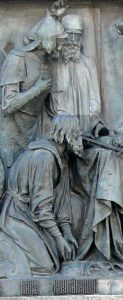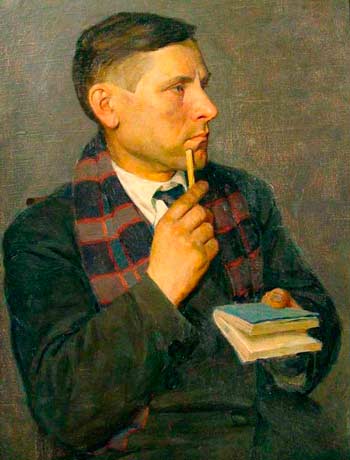“The Tale” by Abraham Palitsyna
 The famous figure of the Time of Troubles, Avraham Palitsyn, described the circumstances of protection from the Polish troops of the Trinity-Sergius Lavra and his personal exploits in a work entitled: “The Legend of the Troitsky Sergiyev Monastery siege from the Poles and Lithuania, and the insurgencies later in Russia, composed by the Holy Trinity Monastery Kelarem Abraham Palitsyn. This “Legend” is a monument, remarkable as much in literary as in historical terms and reveals in the author remarkable literary talent and not only the reading in books of theological content, but also familiarity with the facts of the history of civil and even philosophy.
The famous figure of the Time of Troubles, Avraham Palitsyn, described the circumstances of protection from the Polish troops of the Trinity-Sergius Lavra and his personal exploits in a work entitled: “The Legend of the Troitsky Sergiyev Monastery siege from the Poles and Lithuania, and the insurgencies later in Russia, composed by the Holy Trinity Monastery Kelarem Abraham Palitsyn. This “Legend” is a monument, remarkable as much in literary as in historical terms and reveals in the author remarkable literary talent and not only the reading in books of theological content, but also familiarity with the facts of the history of civil and even philosophy.
The Legend consists of 86 chapters and covers, with varying degrees of thoroughness, events from the death of Ivan IV and the beginning of the reign of Boris Godunov to the Deulinsky Armistice. The tone of the story is even and restrained. Depicting events in which he participated personally and, moreover, held a prominent position, Avraamy Palitsyn does not settle accounts with anyone, tries to be impartial and in unfavorable reviews, for example, in relation to Tsar Boris, is looking for excuses in the opinion of the people.
Nevertheless, in places in the “Tale” one feels an involuntary, perhaps the desire to justify oneself, to give contemporaries and offspring about one’s personality a different idea than that which could exist in his time. This explains the seemingly strange fact that Abraham speaks little of the Trinity archimandrite of Dionysius, in which he played a minor role, and of other persons with whom he came into close contact. Meanwhile, he was friendly with Dionysius and, when the latter was imprisoned, Palitsyn sent him a “comforting” message; they were like-minded on the subject of the correction of books.
Having borrowed many techniques from the old literary school, Abraham made, however, the “Legend” peculiar both in language, everywhere processed and fluent, and in a special, rhythmic turn of speech. The syllable is replete with apt and original expressions. Pious reflections and quotations from the Holy Scripture do not in any way violate the harmony of phrases in the “Tale” and do not obscure the meaning. Where Abraham describes the calamities of the Russian land and the sufferings of the monks, for example, when “Poliyan was the platform of church tears and he was singing from many crying,” his syllable, generally calm, rises to true lyricism.
The Legend, like the facts of history, reflects the personality of Palitsyn — extraordinary in mind, strong in spirit, energetic, zealous in matters of faith and love for the fatherland, always executed with good intentions, but not without vain ambition and flexible in political relations.
In print, not handwritten “The Legend of Abraham Palitsyn” was first published in 1784 and 1822.



